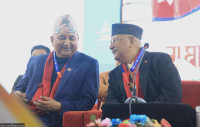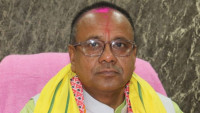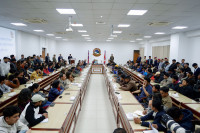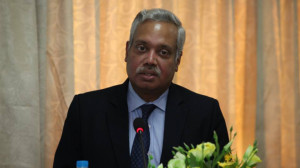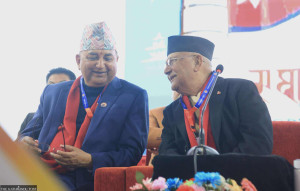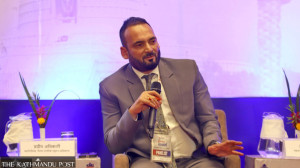National
Ruling party’s split continues to fuel conflict in provinces
Province 1 Chief Minister Rai suspends 15 party members after they file a no-confidence motion against him.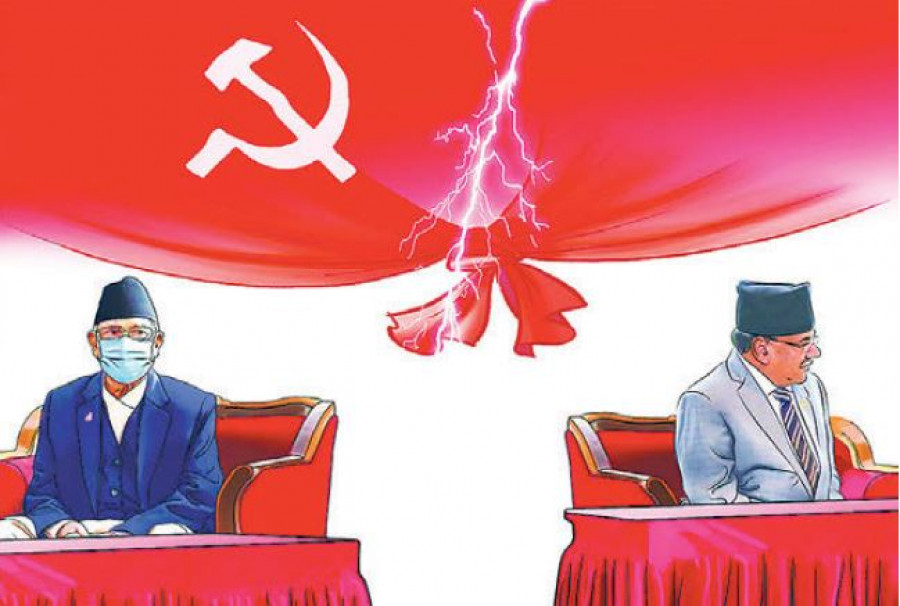
Tika R Pradhan
Two days after Prime Minister KP Sharma Oli’s Cabinet recommended the dissolution of the House of Representatives, his Nepal Communist Party, through a decision of its Central Committee, in which the opposition faction has a majority, took disciplinary action against him.
Then the faction led by Pushpa Kamal Dahal and Madhav Kumar Nepal, through the party’s Central Committee, nominated Nepal as chair, replacing Oli.
The split at the centre is now reverberating in the provinces.
On Thursday, Chief Minister of Province 1 Sherdhan Rai, a close ally of the prime minister, suspended 15 provincial lawmakers of his own party for three months for their involvement in a no-confidence motion against him.
“The process of taking action against the provincial assembly members who defied the party statute has begun with the suspension of a number of them,” Rai, the chief minister, told the Post over the phone.
On Monday the chief minister had sought clarification from 19 members of the Dahal-Nepal faction who had signed the no-confidence motion registered at the assembly secretariat on Sunday.
“They should have first registered the motion at the provincial parliamentary party, but they directly registered it at the assembly’s secretariat which is unlawful,” said Rai.
According to Rai, the party statute stipulates that the provincial parliamentary party leader be chosen before a no-confidence motion can be registered.
However, according to Rajendra Rai, who belongs to the Dahal-Nepal faction, that is not necessary.
It was only on Wednesday evening, three days after registering the no-confidence motion against Rai, that members of the provincial parliamentary party elected Bhim Acharya, also a member of the party’s Standing Committee, as its leader by ousting Rai.
Acharya, who belongs to the Dahal-Nepal faction, had lost by two votes against Rai in the provincial parliamentary party leader election in 2017.
Of the 93 members in the Province 1 assembly, the Nepal Communist Party has 67.
“We have elected Bhim Acharya as our parliamentary party leader after suspending Sherdhan Rai,” said Indra Aangbo, who was a minister in Rai's Cabinet before being sacked. “Both sides are trying to attract members of the provincial assembly.”
According to Aangbo, of the 37 assembly members who had signed the no-confidence motion, one has switched to Rai’s camp while two members of Rai's camp have joined them.
Despite Rai’s claim that the process of registering the no-confidence motion was flawed, legal experts feel now that a no-confidence motion has been registered, the chief minister should face it.
“The only way to remove a chief minister is through the provincial assembly,” said senior advocate Chandra Kanta Gyawali, an expert on constitutional issues.
But he cannot suspend people’s representatives, he added.
“A people’s representative cannot be suspended from doing his/her duty because of indiscipline in party matters,” said Gyawali.
Rai, since the majority of the members in his parliamentary party has removed him from the leadership, must tender his resignation on moral grounds, according to Gyawali.
Even if Rai does not resign as the provincial parliamentary party leader on moral grounds, he will have to face the no-confidence motion, provided that the present equation does not change, on January 20 when the provincial assembly convenes.
Uncertainty, however, reigns over the fate of Bagmati Chief Minister Dormani Poudel despite being the first of the Nepal Communist Party chief ministers against whom a no-confidence motion was filed following the split in the party.
On December 25, 45 of the 80 Nepal Communist Party provincial assembly members filed a no-confidence motion against Poudel but the date for the assembly session is yet to be announced.
As per the party statute, the chief minister must call the provincial assembly session within a month after the no-confidence motion has been registered but it has not been summoned yet.
Unlike in the case of Province 1, the provincial assembly members first chose Asta Laxmi Shakya as the new leader on December 24 to replace Poudel.
But Poudel has sought clarification from 30 members of the provincial assembly involved in registering the no-confidence motion against him.
“The leaders have responded to the clarification saying that there was no meaning of such clarification because Poudel was already ousted by the provincial parliamentary party and the no-confidence motion had been registered at the assembly secretariat,” said Shakilram Jammarkattel, who had led the no-confidence motion after resigning as a provincial minister along with two others.
But unlike Rai, Poudel has not suspended any provincial assembly member yet, signifying murky legal aspects of the whole situation in a country that has just embraced federalism.
But Jammarkattel feels that both Poudel and Rai should resign.
“Instead of resigning, the chief ministers are putting up an act even when they have been removed as party leaders by majority votes,” he told the Post.
The split in the party may not have played out to the same extent in the other provinces but there are already signs of tussles.
On Tuesday, Chief Minister of the Sudurpaschim Province Trilochan Bhatta sacked Pathan Singh Bohora, an Oli ally and minister for Physical Infrastructure and Development. Pathan was the only representative of the Oli faction in the seven-member provincial Cabinet.
Former Maoist leader Bhatta continues to have the support of the majority of the provincial assembly members for the moment but how long that is going to last remains to be seen.
He became chief minister mainly because of the support of federal Minister of Industry, Commerce and Supplies Lekh Raj Bhatta, who belonged to the Dahal-led Communist Party of Nepal (Maoist Centre) before it merged with the CPN-UML to form Nepal Communist Party in May, 2018.
But the federal minister has switched to the Oli camp.
According to Mahesh Dutta Joshi, a provincial assembly member who switched sides to the Oli camp despite belonging to the erstwhile CPN (Maoist Centre), attempts are on to garner a majority against Chief Minister Bhatta if he refuses to jump ship.
In the 53-member assembly, 39 are from the ruling party, 12 from the Nepali Congress and two are from the Janata Samajbadi Party. Of the 39 members belonging to the Nepal faction of the Nepal Communist Party, according to Joshi, nine members already support Oli and the number could increase.
But Khagaraj Bhatta, a central committee member of the Dahal-Nepal faction, claimed that Bhatta is in comfortable majority as only Joshi, formerly of the Maoist camp, has taken Oli’s side till now.
Neighbouring Karnali Province already saw an episode of no-confidence motion against Chief Minister Mahendra Bahadur Shahi in October when a faction belonging to the erstwhile CPN-UML registered a no-confidence motion against him but was later withdrawn after the Nepal faction backed out.
In Gandaki Province, Chief Minister Prithvi Subba Gurung, a staunch Oli supporter, is in comfortable majority while in Lumbini Chief Minister Shankar Pokhrel may not be as comfortable but is reasonably so.
Of the 87 provincial assembly members, Nepal Communist Party has 61. Pokhrel has the support of 40 and needs only four more votes to enjoy a majority.
For analysts, all the jousting is expected.
“Parties tend to take extreme measures when there is a conflict,” said Shyam Shrestha, a political analyst who followed left politics for decades. “The conflict has already reached the provincial level from the centre. Soon, from the provincial level it will reach the local level.”




 20.12°C Kathmandu
20.12°C Kathmandu
